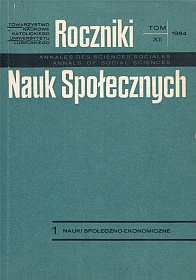Płeć jako czynnik różnicujący dynamikę postaw i zachowań religijnych ludności wiejskiej
Abstrakt
In the present paper the author presents the development of religiousness, including continuing elements and changes, basing on the empirical materials from the 60s and 70s. The author’s intention is to show the direction and the speed of changes with regards to religion according to sex. The mere „state of affairs” as it is at present is of less concern for the author. Sex has a differentiating influence on religiousness in all its aspects (with the exception of the parish). Women tend to make the declaration of „1 believe” more often and changes in their religious attitudes are slower. They also more familiar with the dogmas of the faith and are more attached to the rituals of religious life. Their observance of the orders with regard to the Catholic sexual morality is more orthodox. Here, there is a direct dependence in this respect for both of the discussed periods.
The differences between men and women with regard to religiousness became even greater, in the years 1937-1976. Women’s dynamics was weaker, with only the growth of ignorance of religious doctrines being faster. As for religious practices both groups were on the same level. In all other aspects changes in the group of „men” were deeper, particularly with relation to catholic dogmas, religious practices and some ties with the parish. Subjective self-assessments were reflected in detailed analyses.
Industrial an urban influence on rural people in the region of Plock did not introduce any principal changes in traditional beliefs, religious attitudes and behaviour (cultural tradiness). A rural family, supported by the Church and partly by local society protects its religious values and does not yield to external secularizing influence.
Despite all this changes in the region discussed here are slow. There are no examples of renouncing religion by rural people. However, there does appear a critical and selective attitude towards religious tradition and religious teaching, especially in matters loosely connected with dogmas of the faith. The family and matrimonial sphere can be good example here.
This new selective attitude towards religion, serious and inconsistent as it is, constitutes a novum among the rural people. It is a certain social-cultural process, and thus, there is need for further research in this field in order that we could rightly anticipate the changes in rural society. The parish, as it is, preserves its fundamental character in socio-cultural, religious matters.
Copyright (c) 1984 Roczniki Nauk Społecznych

Utwór dostępny jest na licencji Creative Commons Uznanie autorstwa – Użycie niekomercyjne – Bez utworów zależnych 4.0 Międzynarodowe.


